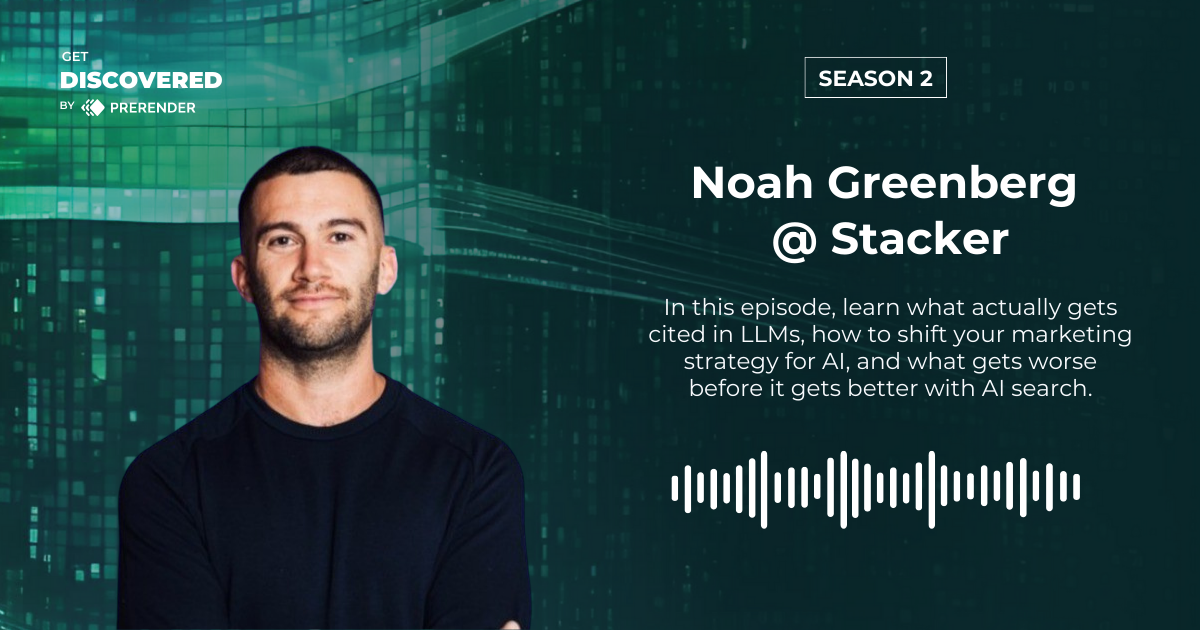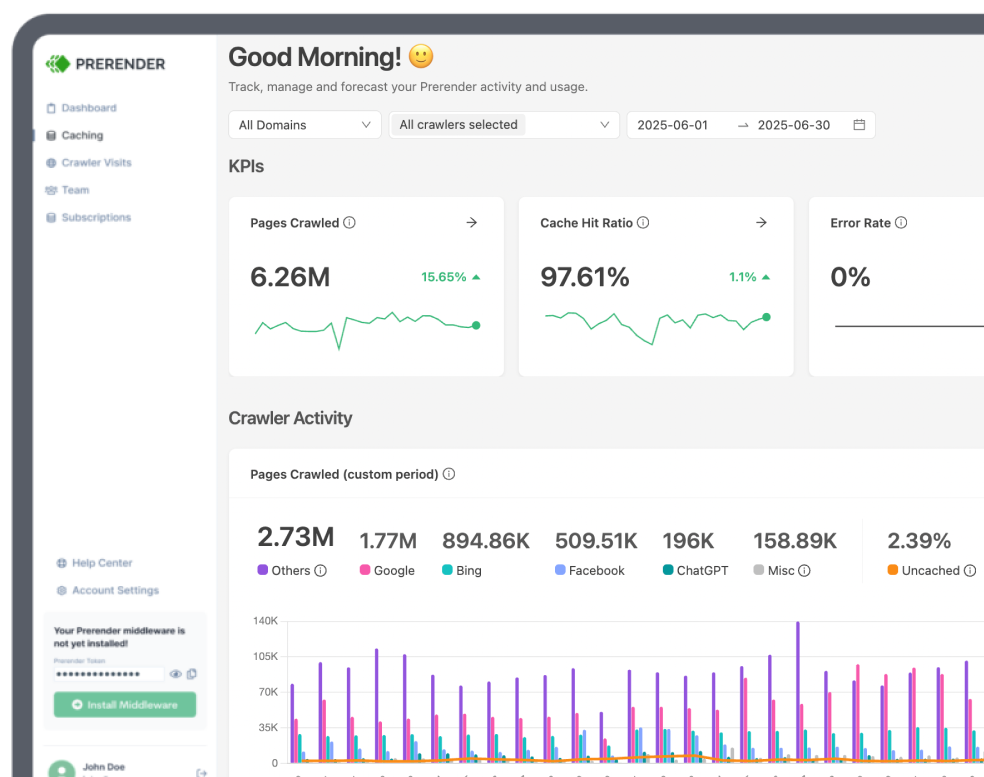Enterprise SEO is the practice of improving rankings and online brand recognition of large organizations’ websites – usually in the hundreds of thousands of pages – with scalable strategies and automation.
Although SEO best practices still apply on these types of sites (enterprise websites), because of their impact on revenue, complex development processes, and scale, there’s a need for a shift in mindset.
Now, the focus is not only on growing search rankings but also on allowing the website (and thus, the company’s online presence) to grow sustainably without compromising its scalability. So, this brings a few unique challenges that smaller websites don’t often face (or, at least, face in smaller ways).
What Makes Enterprise SEO Different to “Normal” SEO?
When it comes to enterprise SEO, there isn’t a concrete definition of what an enterprise website is.
Some people talk about its size, or the team needed to manage it. Other times, people talk about the size of the organization and the value the website for the company. No matter the definition, there are some unique characteristics these websites share that influence how SEO needs to be managed:
1. Work needs to be done for and at scale
SEO is a multidisciplinary marketing channel. It needs content, link building, development, design, content distribution, etc., to be successful. All of these need to be done for an enterprise site but multiplied exponentially. Every task needs to be done at a larger scale than a regular site.
Just think about page optimization: it’s not just about optimizing a couple of pages, but thousands. Also, changes and strategies need to scale. For example, content production needs to be more aggressive (hitting even 20 – 30 new pages a month), but it also needs to be high-quality and pass several controls.
2. Handling multiple sites or subdomains
As enterprise businesses grow, they’ll expand to new territories, create content on different domains, and evolve their offerings rapidly. In most cases, all this content and its variations can’t be held under one single domain, so the entire brand will depend on several properties that need to be managed.
Every location might have its own domain/subdomain, and different content for different audiences might be grouped into subdomains. Keeping every property on-brand, avoiding duplicate issues, and growing each property’s rankings without stepping on each other’s toes, is a big part of an enterprise strategy.
3. There are more opportunities for link building, but also more work
Brand reputation has a significant influence on backlinks.
SEOs can use their company’s brand reputation to scale and take advantage of opportunities small sites can’t profit from.
Unique statistics, studies, or stories from a recognized brand can open the door to generating organic links in large numbers, and unliked mentions can scale to the hundreds per month with the right tool.
However, enterprise sites are also competing against other companies in their market, so just a couple of monthly links aren’t enough. For enterprise sites to rank and stay on top of the competition, link building work multiplies, and there’s also more pressure on the kind of stories and sites SEOs form alliances with.
4. More brand recognition, more need to incorporate reputation management
Although your brand brings a lot of opportunities for link building, it also increases the chances of bad PR. When unfair claims start to fill the SERPs, you’ll need a team to change the narrative through content, community building, and technical SEO, to curate the SERPs and mitigate potential harm.
5. Handling and optimizing a massive number of pages
We must mention how daunting a spreadsheet with millions of URLs waiting to be optimized looks.
A high number of pages can be a good thing for many reasons, but it also makes making decisions much harder. Low-quality pages, thin content, duplicate content, and technical issues are really common on projects at this scale, and strategies like content pruning need to be done more delicately.
Just removing one page could mean hundreds of broken internal links. Deleting the wrong page? You can hurt site authority. Also, optimization requires a more thoughtful approach and, in most cases, requires a certain level of automation to make the process manageable.
6. Selling SEO to teams and stakeholders
Because of their size, enterprise sites require a lot of collaboration across teams.
However, SEO requires a lot of input from other departments like content, social media, developers, etc. Ask around, and you’ll find more than one story on selling SEO changes to the development team.
This is normal and expected, so SEOs must become great communicators and negotiators to find the help they need promptly. Still, changes require approval from different stakeholders. For example, if you’re about to change one element on a template, it can implicate thousands of pages.
This means that every small or big change requires a thorough evaluation before taking action.
7. Automation is a must for efficiency
Tools are always an essential part of SEO teams to work efficiently.
Enterprise sites take this to another level because without automation, there’s no way to manage a site as complex and big – not well, at least. Several technical SEO tools offer custom plans and unique features, while others specialize in these sites with unique functionalities designed for scaling.
Solutions to automate internal linking, do keyword research at a larger scale, or even custom tools like custom-built scrapers to monitor brand reputation are some solutions enterprise SEOs will need to manage these websites.
5 Enterprise SEO Tools Worth Considering
Another important distinction between regular SEO and enterprise SEO is the tools.
You’ll need more robust solutions to handle the workload effectively.
In our experience, these are five enterprise tools you should consider:
Seobility – best for on-page SEO and content optimization
Generating high-quality and optimized content is crucial for your SEO success. Seobility is a great tool to help speed up the process and handle big workloads without lowering the quality of optimizations.
For starters, Seobility’s enterprise website audit tool can extensively find and solve technical errors and on-page SEO issues to improve your ranks. The tool will check more than 300 SEO-relevant factors, resulting in 50+ analyses that are grouped into three main categories:
- Technical and meta: crawling issues, problematic meta tags and URLs, etc.
- Structure: internal linkings, anchor text, site hierarchy, etc.
- Content: content relevancy and duplicate content
They also offer other SEO optimization products that are robust to handle your enterprise-scale website, including backlink analysis, keyword research, and text/content optimization (TF*IDF).
Prerender.io – best to improve crawl budget and rendering
Although it’s not unique to enterprise websites, handling JavaScript and dynamic content for hundreds of thousands of URLs is a different breed of challenge.
The biggest problem with JavaScript and large websites is crawl budget. Small websites have more than enough crawl budget to spare on Google’s renderer, so with a well-planned strategy, they should be ok.
However, for websites reaching 10 – 100k+ URLs, it’s not such an easy process. As Google takes more resources and time to fetch all files and render the content, it can quickly start a chain reaction of partially rendered pages. By this, we mean pages taking weeks and months before they’re finally crawled, and deep pages (pages 3 – 5 clicks away from the homepage) not getting discovered at all.
Not only that, but it’ll also affect your PageSpeed Insights score (including core web vitals), ultimately translating into poor rankings. To combat all these issues quickly and affordably – without investing in setting and maintaining your own servers and infrastructure – you can use Prerender.
Prerender will generate a fully rendered snapshot of your JavaScript pages and serve them as static HTML to search engine bots on demand. Instead of having Google do all the work on your crawl budget expenses, Prerender will take the rending task away and provide your content ready for crawling and indexing, increasing Page Speed scores and improving crawl budget efficiency.
If you’re using Angular, React, or Vue to build and scale your site, Prerender can reduce your team’s workload and help them rank your site faster without almost no input from their end.
All that’s needed is installing Prerender middleware.
Lumar.io – best for technical SEO
Screaming Frog (SF) is the defacto solution for crawling websites for technical SEO. However, in the case of enterprise websites, it can be harder to use. Not only because analyzing all the data from SF at this scale will require a lot of time and knowledge but because it will also require better hardware to handle the crawl process and store the data efficiently.
For these larger websites, it’s better to take part of this burden out of your machines and use a tool that’ll take care of the process and – to some extent – analysis. A tool that standout for this application is Lumar (formerly DeepCrawl).
Lumar is a cloud-based crawler that provides highly accurate technical SEO reports and supplementary data, allowing your team to automate audits, crawl sites and analyze data faster and at a bigger scale.
A feature most enterprise websites will appreciate is site monitoring to manually or automatically generate alerts when website updates can harm your site and find negative trends before they become critical issues – like drops in page speed.
Keyword.com – best for rank tracking at scale
Enterprise websites rank for thousands of keywords, a number that will only continue to expand over time. So much data is overwhelming for SEO teams that need to consider several variables for each keyword they’re trying to compete for.
Even after succeeding in getting the first spots, the next important battle is keeping those ranks.
Keyword.com is a keyword position and rank tracker that provides accurate data on keyword rankings and SERPs. Keyword.com is different from other rank tracker tools in this niche because it has features that enterprise teams need to track their SEO performance without the noise that comes with traditional solutions.
Besides tracking lists of keywords, you can also group keywords and get an overall performance report for clusters, providing insights into how your site performs for specific topics. As part of reporting, it’s easy to set up daily updates to the teams’ inbox and automatically generate reports for stakeholders, providing all the relevant information they need and reducing reporting time from the team.
However, the following three features make Keyword a great enterprise tool for us:
- It provides granular data for each keyword – you can get SERP data for each keyword from a specific location (country and city level), from mobile or desktop and even store snapshots of the SERPs to keep track of positions (not estimates).
- It monitors your competitors’ ranking changes – keeping an eye on your competitors and how they’re moving on the SERPs is crucial to prevent outranks. Setting an alert when a competitor is closer to surpassing your page can make a big difference.
- It offers unlimited API calls – data is not locked into its platform, allowing you to use YOUR data wherever you want without upgrading your plan. You can use this data to build your own dashboards or integrate this data with a more extensive set, keeping everything in one place.
SparkToro.com – best for audience research
Data is vital for your SEO campaign, but finding accurate, relevant data to inform your marketing and content strategy can get tricky and expensive.
As your offerings grow, you’ll need to battle new competitors and understand new audiences’ needs and interests. SparkToro is an audience research platform that allows you to gather audience information through a query.
SparkToro will provide:
- Age, gender, education, and interests information
- Websites your audience visits
- Social accounts they follow
- Podcasts they subscribe to
- Language in their content (Reddit, Twitter, Facebook, Instagram, YouTube comments, etc.)
With all this information, your team will be able to establish partnerships with relevant influencers and publications, know the kind of content that attracts their target audience and build data-driven customer personas.
Lighting Round [Bonus]
While the tools above will help your team to manage some of the unique challenges enterprise websites face, we want to quickly mention three more tools that’ll help your team cover more ground:
SEMrush is a comprehensive SEO platform that provides many tools to manage your website in a single place.
Note: These features can’t match the capabilities of specialized tools. For example, SEMrush can perform technical audits, but Lumar reports and constant monitoring are a better solution.
This tool excels especially for link data. It has a robust and ever-growing backlink index, allowing you to find toxic links and generate disallow files, find the best links from your competitors and find backlink opportunities fairly quickly.
However, when it comes to competitor research, SpyFu has no comparison. Although SpyFu is more targeted to PPC, it can also help you monitor your competitors’ backlinks based on keywords and keep track of their overall performance.
The best part is that its UI is simple and clean, so there’s no clutter on the way of getting the data.
The last honorable mention is for Brand24. As said previously, online reputation is more critical for enterprise-level brands, so having systems to automate this process is vital for success.
Brand24 monitors the web for mentions of your brand, automating sentiment analysis and alerting you when things are going wrong. You can also use the tool to find unlinked mentions to gain new backlinks and engage with your audience on relevant discussions across the web.
Enterprise SEO has unique challenges and thus requires a different mindset, strategies, and tools. With the right enterprise SEO strategies, you’ll be able to secure new rankings while setting your website for sustainable growth.
If you’re the owner or part of a team managing an enterprise site, we would love to know the hardest challenge you’ve overcome so far and why. Find us on Twitter, and share your experience.



